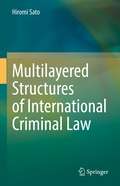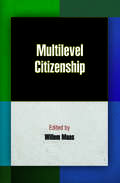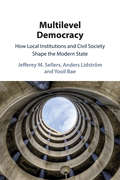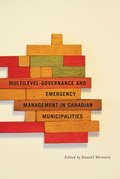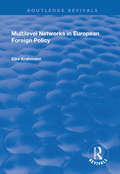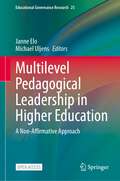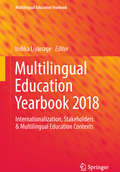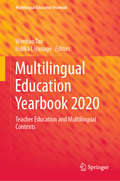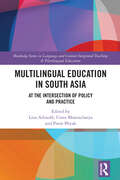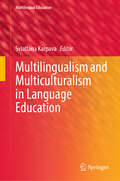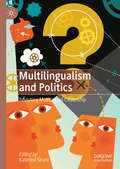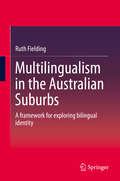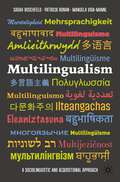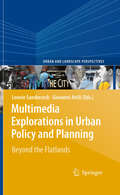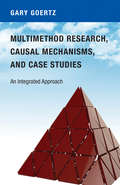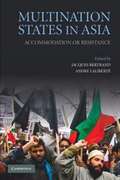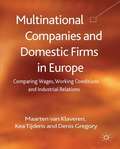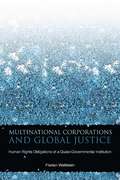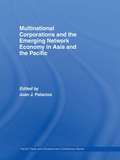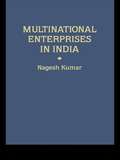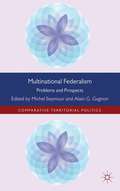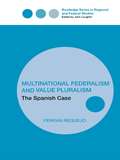- Table View
- List View
Multilayered Structures of International Criminal Law
by Hiromi SatoThis book discusses the multilayered legal structures concerning the regulation of crimes under international law. It covers both core crimes and other types of crime under international law, and examines relevant substantive and procedural rules alike. Pursuing such a comprehensive approach is essential to understanding the basic frameworks of international criminal law, since the varied perspectives on international crimes are connected to different systems of enforcement. Being aware of this interrelatedness is conducive to an in-depth examination of individual topics in both substantive and procedural aspects. On the basis of such an inquiry, this book concisely provides a systematic overview of international criminal law.
Multilevel Citizenship (Democracy, Citizenship, and Constitutionalism)
by Willem MaasCitizenship has come to mean legal and political equality within a sovereign nation-state; in international law, only states may determine who is and who is not a citizen. But such unitary status is the historical exception: before sovereign nation-states became the prevailing form of political organization, citizenship had a range of definitions and applications. Today, nonstate communities and jurisdictions both below and above the state level are once again becoming important sources of rights, allegiance, and status, thereby constituting renewed forms of multilevel citizenship. For example, while the European Union protects the nation-state's right to determine its own members, the project to construct a democratic polity beyond national borders challenges the sovereignty of member governments.Multilevel Citizenship disputes the dominant narrative of citizenship as a homogeneous status that can be bestowed only by nation-states. The contributors examine past and present case studies that complicate the meaning and function of citizenship, including residual allegiance to empires, constitutional rights that are accessible to noncitizens, and the nonstate allegiance of nomadic nations. Their analyses consider the inconsistencies and exceptions of national citizenship as a political concept, such as overlapping jurisdictions and shared governance, as well as the emergent forms of sub- or supranational citizenships. Multilevel Citizenship captures the complexity of citizenship in practice, both at different levels and in different places and times.Contributors: Elizabeth F. Cohen, Elizabeth Dale, Will Hanley, Marc Helbling, Türküler Isiksel, Jenn Kinney, Sheryl Lightfoot, Willem Maas, Catherine Neveu, Luicy Pedroza, Eldar Sarajlić, Rogers M. Smith.
Multilevel Democracy: How Local Institutions and Civil Society Shape the Modern State
by Jefferey M. Sellers Yooil Bae Anders LidströmThis volume presents the first systematic comparative analysis of national traditions of local democracy across the developed world, as well as their origins and evolution. It reveals how inclusive local institutions that integrate national and local governance make democracy work better. Across most of the developed world, early forms of the national state entrenched the local power of elites. In Anglo-American and Swiss democracies, state formation imposed enduring tensions with local civic governance. In contrast, inclusive, integrative local institutions in Northern Europe enabled close links with central government around common local and national agendas, producing better governance and fuller democracy to the present day. Through comparative analysis, the authors demonstrate how institutions for local governance and the participation of civil society differ widely among developed democracies, and how local democracy relates to national democracy. The resulting insights fundamentally recast our understanding of how to build and maintain more effective democracies.
Multilevel Governance and Emergency Management in Canadian Municipalities
by Daniel HenstraWhether it is wildfires in Alberta, widespread flooding in Newfoundland, or massive snowstorms in Nova Scotia, Canadian governments must be prepared to manage a range of emergencies. Many organizations and resources have to be coordinated in emergency management, and the quality of emergency planning has a direct impact on the effectiveness of disaster response. Municipalities have primary responsibility, but emergency management requires authority and resources from all levels of government as well as collaboration with stakeholders from the private and voluntary sectors. Drawing on extensive documentary evidence and many interviews with government officials and stakeholders, Multilevel Governance and Emergency Management in Canadian Municipalities provides a comprehensive assessment of the structure and dynamics of emergency management in Canada. Contributors analyze the role of the federal government, compare policies and governance in three different provinces, and examine approaches to emergency planning in thirteen municipalities of varying sizes. In addition to describing political and legal frameworks, essays investigate how emergency management policies are shaped by the relationships between municipal, provincial, and federal officials, as well as with social interests that are concerned about planning for emergencies. Contributors also assess the quality of emergency management. Despite the growing importance of emergency management, there has been little comparative research on Canadian policy making in this field. Multilevel Governance and Emergency Management in Canadian Municipalities provides insights into how governments have readied themselves for emergencies and how they can better prepare. Contributors include Norm Catto (Memorial University), Malcolm Grieve (retired, Acadia University), Geoffrey Hale (University of Lethbridge), Daniel Henstra (University of Waterloo), Luc Juillet (University of Ottawa), Junichiro Koji (PhD, University of Ottawa), Stephen Tomblin (Memorial University), Lori Turnbell (Dalhousie University), and Robert Young (University of Western Ontario).
Multilevel Governance and Emergency Management in Canadian Municipalities (Fields of Governance: Policy Making in Canadian Municipalities #6)
by Daniel HenstraWhether it is wildfires in Alberta, widespread flooding in Newfoundland, or massive snowstorms in Nova Scotia, Canadian governments must be prepared to manage a range of emergencies. Many organizations and resources have to be coordinated in emergency management, and the quality of emergency planning has a direct impact on the effectiveness of disaster response. Municipalities have primary responsibility, but emergency management requires authority and resources from all levels of government as well as collaboration with stakeholders from the private and voluntary sectors. Drawing on extensive documentary evidence and many interviews with government officials and stakeholders, Multilevel Governance and Emergency Management in Canadian Municipalities provides a comprehensive assessment of the structure and dynamics of emergency management in Canada. Contributors analyze the role of the federal government, compare policies and governance in three different provinces, and examine approaches to emergency planning in thirteen municipalities of varying sizes. In addition to describing political and legal frameworks, essays investigate how emergency management policies are shaped by the relationships between municipal, provincial, and federal officials, as well as with social interests that are concerned about planning for emergencies. Contributors also assess the quality of emergency management. Despite the growing importance of emergency management, there has been little comparative research on Canadian policy making in this field. Multilevel Governance and Emergency Management in Canadian Municipalities provides insights into how governments have readied themselves for emergencies and how they can better prepare. Contributors include Norm Catto (Memorial University), Malcolm Grieve (retired, Acadia University), Geoffrey Hale (University of Lethbridge), Daniel Henstra (University of Waterloo), Luc Juillet (University of Ottawa), Junichiro Koji (PhD, University of Ottawa), Stephen Tomblin (Memorial University), Lori Turnbell (Dalhousie University), and Robert Young (University of Western Ontario).
Multilevel Networks in European Foreign Policy (Routledge Revivals Ser.)
by Elke KrahmannThis title was first published in 2003. Combining a critique of existing multilevel approaches with the development of a new theory and a broad range of case studies, the author of this text aims to provide new insights into contemporary foreign policy decision-making which should be of particular interest to students and scholars of European foreign and security policy and international relations theory.
Multilevel Pedagogical Leadership in Higher Education: A Non-Affirmative Approach (Educational Governance Research #25)
by Michael Uljens Janne EloThis Open Access book addresses the theoretical grounding of the pedagogical dimensions of higher education leadership and its empirical study. The book’s general point of departure is that educational leadership is a multi-level phenomenon, operating as policy work on a transnational and national level, as educational leadership on various organizational levels, and as supervision and teaching on an interactional level. It is in and through these discursive practices that policies are initiated, interpreted, translated and enacted. The volume demonstrates how Non Affirmative Theory (NAT) of education applies to understanding and dealing with the pedagogical dimensions of the multi-level and multi-actor phenomena of HE leadership in a coherent manner. It allows one to explore how the pedagogical scope of action at each level of leadership is framed or staged by the other levels, as well as how actors at different levels utilise their scope. The book starts out by exploring the pedagogical aspects of HE leadership as a multi-level and multi-actor phenomenon at a theoretical level. It continues to discuss nation state HE in a global perspective, and HE leadership in an organisational perspective. Next, the book looks at departmental leadership, management and development. Parallel with this, the volume critically explores the non-affirmative position itself by a contrasting dialogue with other theoretical approaches.
Multilingual Education Yearbook 2018: Internationalization, Stakeholders And Multilingual Education Contexts (Multilingual Education Yearbook Ser.)
by Indika LiyanageThis volume examines how internationalization, stakeholders, and educational contexts have a reciprocal influence on multilinguals and their communities both as individual and collective variables. Therefore, the exploration of these variables and how they intersect and interact with worldwide phenomena like globalization, global citizenship, and responsive and responsible provisions of education are the central foci of this volume. Contributors from different parts of the world draw on analyses of various forms of data to foreground these foci with implications for effective multilingual education practices in their contexts, and beyond.The Multilingual Education Yearbook publishes high-quality empirical research on education in multilingual societies. It publishes research findings that, in addition to providing descriptions of language learning, development and use in language contact and multilingual contexts, will shape language education policy and practices in multilingual societies.
Multilingual Education Yearbook 2020: Teacher Education and Multilingual Contexts (Multilingual Education Yearbook)
by Indika Liyanage Wenhao TaoThis book focuses on the challenges of teaching in diversely multilingual classrooms, discussing how these challenges and complexities interact in the preparation of teachers (language & content areas) in and for multilingual settings, and how they impact on educational processes, developments, and outcomes.Teacher education in multilingual contexts is a key topic and occupies an important position in efforts to improve educational outcomes and quality for all stakeholders. It is seen as essential for competitive participation in global economic activity and for providing opportunities to enjoy the benefits of increased prosperity. Teacher education is generally expected to address both the demand for multilingualism and the challenges of teaching in diversely multilingual classrooms, which are important foci at policy and institutional levels. For example, the demand for quality outcomes is manifested in state-administered standards and performance cultures that regulate entry and practices, and poses ethical and pedagogic dilemmas for teachers. This book presents high-quality empirical research on education in multilingual societies, highlighting findings that, in addition to providing descriptions of language learning, development, and use in language contact and multilingual contexts, will help shape future language education policy and practices in multilingual societies.
Multilingual Education in South Asia: At the Intersection of Policy and Practice (Routledge Series in Language and Content Integrated Teaching & Plurilingual Education)
by Prem Phyak Lina Adinolfi Usree BhattacharyaSpanning scholarly contributions from India, Nepal, Bangladesh, Pakistan, and Sri Lanka, this edited volume seeks to capture and elucidate the distinct challenges, approaches and possible solutions associated with interpreting, adapting and applying language-in-education policies in a range of linguistically complex teaching and learning environments across South Asia. Centring on-the-ground perspectives of scholars, practitioners, pupils, parents and the larger community, the volume offers new insights into one of the most complex, populous, and diverse multilingual educational contexts in the world. Language-in-education policies and practices within this setting represent particularly high stakes issues, playing a pivotal role in determining access to literacy, thereby forming a critical pivot in the reproduction of educational inequality. The broad aim of the collection is thus to highlight the pedagogical, practical, ideological and identity-related implications arising from current language-in-education policies in this region, with the aim of illustrating how systemic inequality is intertwined with such policies and their associated interpretations. Aimed at both academics and practitioners - whether researchers and students in the fields of education, linguistics, sociology, anthropology or South Asian studies, on the one hand, or language policy advisors, curriculum developers, teacher educators, teachers, and members of funding bodies, aid providers or NGOs, on the other - it is anticipated that the accounts in this volume will offer their readership opportunities to consider their wider implications and applications across other rich multilingual settings – be these local, regional, national or global.
Multilingualism and Multiculturalism in Language Education (Multilingual Education #49)
by Sviatlana KarpavaThis volume focuses on multidisciplinary approaches to multilingualism, multiculturalism and language teaching and learning at (pre)primary, secondary and tertiary levels. It addresses both top-down and bottom-up perspectives on language education policies, teacher training and preparation. The book explores the needs and challenges related to education in multilingual classrooms, the relationship between parents and educators, and linguistic and cultural diversity in classrooms. It draws on the findings of research that has been conducted worldwide including in Cyprus, USA, UK, Scotland, Spain, France, Sri Lanka, Slovenia, Australia, New Zealand, Indonesia, Hong Kong, Sweden, Greece, and Italy. This book is ideal for students of (applied) linguistics, (socio)linguistics, psycholinguistics, language acquisition and education, as well as practitioners, teachers, parents, experts and researchers wishing to update their knowledge regarding multilingualism, multiculturalism, language learning, and teaching.
Multilingualism and Politics: Revisiting Multilingual Citizenship
by Katerina StraniThis edited book makes a significant contribution to the relatively under-explored field of multilingualism and politics, approaching the topic from two key perspectives: multilingualism in politics, and the politics of multilingualism. Through the lens of case studies from around the world, the authors in this volume combine theoretical and empirical insights to examine the inter-relation between multilingualism and politics in different spheres and contexts, including minority language policy, national identity, the translation of political debates and discourse, and the use of multiple, often competing languages in educational settings. This book will be of interest to students and scholars in the fields of politics, sociology, sociolinguistics, language policy, and translation and interpreting studies.
Multilingualism in the Australian Suburbs
by Ruth FieldingThis book introduces a framework for examining bilingual identity and presents the cases of seven individual children from a study of young students' bilingual identities in an Australian primary school. The new Bilingual Identity Negotiation Framework brings together three elements that influence bilingual identity development - sociocultural connection, investment and interaction. The cases comprise individual stories about seven young, bilingual students and are complemented by some more general investigations of bilingual identity from a whole class of students at the school. The framework is explained and supported using the students' stories and offers readers a new concept for examining and thinking about bilingual identity. This book builds upon past and current theories of identity and bilingualism and expands on these to identify three interlinking elements within bilingual identity. The book highlights the need for greater dialogue between different sectors of research and education relating to languages and bilingualism. It adds to the increasing call for collaborative work from the different fields interested in language learning and teaching such as TESOL, bilingualism, and language education. Through the development of the framework and the students' stories in this study, this book shows how multilingual children in one school in Australia developed their identities in association with their home and school languages. This provides readers with a model for examining bilingual identity in their own contexts, or a theoretical construct to consider in their thinking on bilingualism, language and identity.
Multilingualism: A Sociolinguistic and Acquisitional Approach
by Sarah Buschfeld Manuela Vida-Mannl Patricia RonanThis textbook takes a broad perspective on multilingualism, using a sociolinguistics and acquisition-informed approach that treats multilingualism not solely as the mastery of two or more well-defined language systems, but rather as a continuum of linguistic repertoires and resources to be used in different settings and combinations. The authors introduce traditional aspects of multilingualism - including historical dimensions, societal and individual multilingualism, aspects of identities, ideologies, education, and language policies - before going on to examine newer manifestations such as multilingualism in migrant and refugee contexts, in new media, pop music and linguistic landscaping, as well as the notion of grassroots multilingualism. This textbook will be an ideal resource for postgraduate students of linguistics and multilingualism, as well as advanced undergraduate students who are looking for a nuanced and holistic approach to the topic.
Multimedia Explorations in Urban Policy and Planning
by Giovanni Attili Leonie SandercockThe book is a collection of essays exploring the potential of multimedia to enrich and transform the planning field. By multimedia the authors refer to a broad range of new information and communication technologies (from film and video to digital ethnography and the internet), which are opening up new possibilities in planning practices, processes, pedagogy and research. The authors document the ways in which these ICTs can expand the language of planning and the creativity of planners; can evoke the lived experience (the spirit, memories, desires) of our 21st century mongrel cities by engaging with stories and storytelling; and can democratise planning practices. The text is epistemologically radical, in presenting an argument for the importance of "multiple languages" (ways of knowing) in the planning field, and making the connection between this epistemology and the almost infinite potential of Multimedia to provide varied tools to accomplish this transformation, displacing the supremacy of the rational, linear and hierarchical with more open, playful and imaginative approaches. Each of the authors brings practical experience with different forms of Multimedia use and reflects on the different potentialities offered by Multimedia for critical intervention in urban and regional issues, and the power dynamics embedded in such interventions.
Multimethod Research, Causal Mechanisms, and Case Studies: An Integrated Approach
by Gary GoertzAn innovative and accessible textbook on multimethod and case-study researchMultimethod research has become indispensable to doing social science, and is essential to anyone who conducts large-scale research projects in political science, sociology, education, comparative law, or business. This authoritative and accessible book offers the first truly comprehensive approach to multimethod and case-study research, and is particularly aimed at students of qualitative methods in the social sciences.Walking step-by-step through these cutting-edge tools and techniques, Gary Goertz introduces a new integrated approach that unites three corners of a powerful research triad—causal mechanisms, cross-case causal inference, and within-case causal inference. He explains how the investigation of causal mechanisms and the making of within-case causal inference are the central goals of multimethod and case study research, and provides a logic for connecting case studies and causal mechanism analysis with cross-case analysis, whether they are statistical analyses, experiments, or QCA. In addition, Goertz analyzes how one can generalize using case studies, as well as systematically test game-theoretic and other models using multiple case studies.Provides a fully integrated approach to multimethod and case-study researchAn essential resource for students and researchers in political science, sociology, education, law, and businessCovers constraint causal mechanism, game theory and case studies, QCA, and the use of case studies to systematically test and generalize theoriesAn ideal textbook for a first-year graduate course in methods or research design
Multination States in Asia
by Jacques Bertrand André LalibertéAs countries in Asia try to create unified polities, many face challenges from minority groups within their own borders seeking independence. This volume brings together international experts on countries in all regions of Asia to debate how differently they have responded to this problem. Why have some Asian countries, for example, clamped down on their national minorities in favour of homogeneity, whereas others have been willing to accommodate statehood or at least some form of political autonomy? Together they suggest broad patterns and explanatory factors that are rooted in the domestic arena, including state structure and regime type, as well as historical trajectories. In particular, they find that the paths to independence, as well as the cultural elements that have been selected to define post-colonial identities, have decisively influenced state strategies. This is a global phenomenon - and the book explains the broader theoretical and political implications - but violence and ethnic unrest have been particularly prevalent in Asia, and this is as true of China in its relationship to Tibet, as of Burma and Sri Lanka in relation to their national minorities. As the first book to analyse this phenomenon across Asia, it will attract a readership of students and scholars across a broad range of disciplines.
Multinational Companies and Domestic Firms in Europe. Comparing Wages, Working Conditions and Industrial Relations
by Maarten Van Klaveren Kea Tijdens Denis GregoryThe Social Effects of FDI on Multinational Companies and Domestic Firms compares and contrasts wages, working conditions and industrial relations processes in multinational and domestic companies. This book is an effort to map the social effects of FDI in a number of EU member states, in relation to the prevailing patterns of internationalization.
Multinational Corporations and Global Justice: Human Rights Obligations of a Quasi-Governmental Institution
by Florian WettsteinMultinational Corporations and Global Justice: Human Rights Obligations of a Quasi-Governmental Institution addresses the changing role and responsibilities of large multinational companies in the global political economy. This cross- and inter-disciplinary work makes innovative connections between current debates and streams of thought, bringing together global justice, human rights, and corporate responsibility. Conceiving of corporate social responsibility (CSR) from this unique perspective, author Florian Wettstein takes readers well beyond the limitations of conventional notions, which tend to focus on either beneficence or pure charity. While the call for multinationals' involvement in the solution of global problems has become stronger in recent times, few specifics have been laid down regarding how to hold those institutions accountable in the global arena. This text attempts to work out the normative basis underlying the responsibilities of multinational corporations—thereby filling a crucial void in the literature and marking a milestone in the CSR debate.
Multinational Corporations and the Emerging Network Economy in Asia and the Pacific (PAFTAD (Pacific Trade and Development Conference Series))
by Juan J. PalaciosMultinational Corporations and the Emerging Network Economy in Asia and the Pacific delves into the ongoing rise of a global economy anchored in a web of inter-firm production networks and the role played by multinational corporations in the process. It considers the strategies and business models corporations have adopted lately to face today’s highly competitive global markets, especially outsourcing and offshoring, focusing on the modalities observed in Asia Pacific and the Pacific Rim at large. Since their inception, corporations have undergone a series of fundamental changes; each has corresponded to a given era of industrial development and has given rise to a particular type of government policy response. The book addresses these timely issues and other such as the transformation of global production networks into global innovation networks, the link between corporate and national innovation strategies and movement up the global production value chain, and the fragmentation of production and the resulting increase in component and sub-assembly trade in the region. It also takes up the emergence of multinational corporations from developing countries and the efforts aimed at forging basic rules of corporate social responsibility and developing sound institutions for building a working framework of corporate governance in the Pacific. Written by some of the region’s most eminent and influential economists and political scientists, this volume will appeal to students and scholars working in the field of Asia Pacific studies as well as to businesspersons and policymakers taking decisions in the region.
Multinational Enterprises in India: Industrial Distribution (International Business Series)
by Nagesh KumarMultinational enterprises play a vital role in the economic activity of most developing countries. In India MNE affiliates dominate whole sectors of industry - such as plastics and pharmaceuticals - characterised by a high degree of product differentiation, complex technology and high skill intensity. Such advantages, combined with intangible assets, centralised decision making and global outlook lead to a divergence of approach between MNEs and their local counterparts in host developing countries.This book analyses the inter-industry pattern of MNEs in India in the framework of the internationalisation theory, also examining the comparative behaviour of MNE affiliates and LCEs in terms of conduct and performance. The book goes further to explain the different performance of these two strategic groups by assessing profit and export.
Multinational Enterprises in Latin America since the 1990s
by Pablo ToralPrivatization of state-owned enterprises and liberalization of trade and investment flows were two of the cornerstones of the structural reforms implemented by governments across Latin America in the 1990s. Spanish multinational enterprises were attracted by these reforms into industries such as banking and finance, telecommunications, public utilities, and oil and gas. By the late 1990s, Spain passed the United States as the main origin of foreign direct investment flows in Latin America. Building on the know-how developed in previous decades in Spain, Spanish multinationals became major player in these sectors that constituted the backbone of the Latin American economies.
Multinational Enterprises, International Trade, and Productivity Growth: Firm-Level Evidence from the United States
by Wolfgang Keller Stephen R. YeapleA report from the International Monetary Fund.
Multinational Federalism
by Alain-G. Gagnon Michel SeymourA collection of state of the art reflections by fourteen leading experts in the field of multinational federalism. Seymour and Gagnon have gathered contributions from philosophers, political scientists and jurists dealing with the accommodation of peoples in countries like Belgium, Canada, Europe, Great Britain, India and Spain.
Multinational Federalism and Value Pluralism: The Spanish Case (Routledge Studies in Federalism and Decentralization)
by Ferran RequejoThis book addresses the democratic accommodation of national pluralism through federal rules. The key question is: can federalism be a fair and workable way of articulating multinational societies according to revised liberal-democratic patterns? In recent years, scholarly discussion on this issue has undergone a change. Nowadays, the answer to this question is much more complex than the one that traditional political liberalism and federalism used to give us. In the past, these two political approaches usually addressed the question of political pluralism without seriously including national pluralism in the discussion, a theoretical attitude that has often misrepresented and impoverished the moral discussions and the institutional practices of multinational democratic federations. Multinational Federalism and Value Pluralism has been awarded the prize for the best book in 2005 by the Spanish Political Science Association (AECPA).
